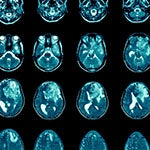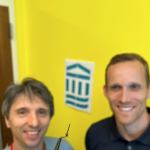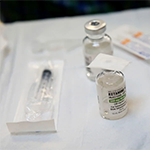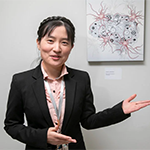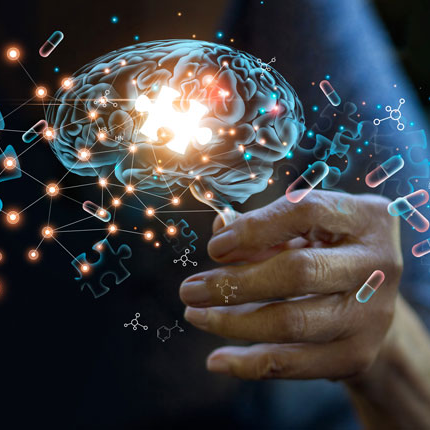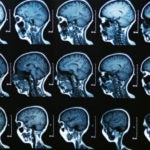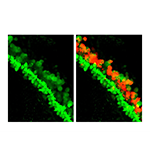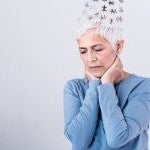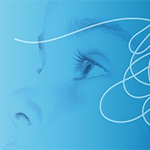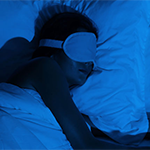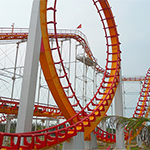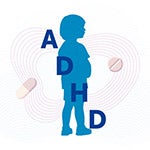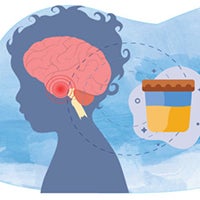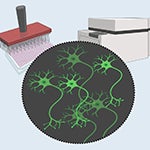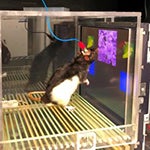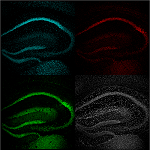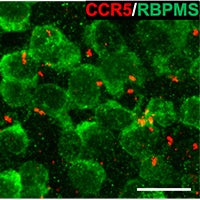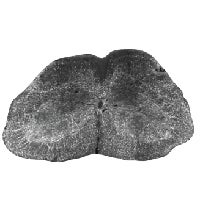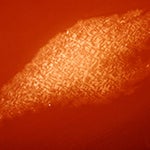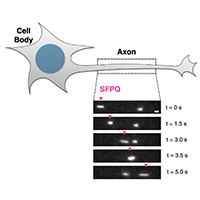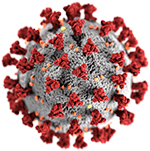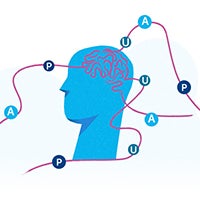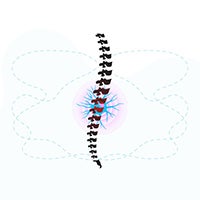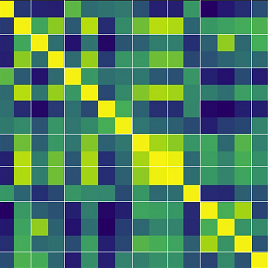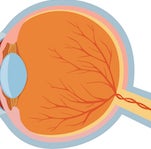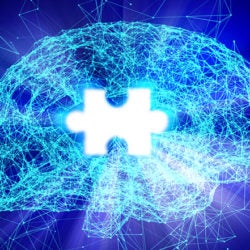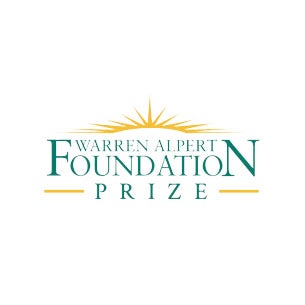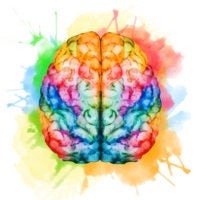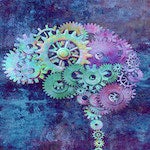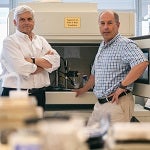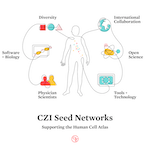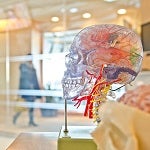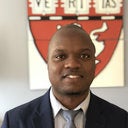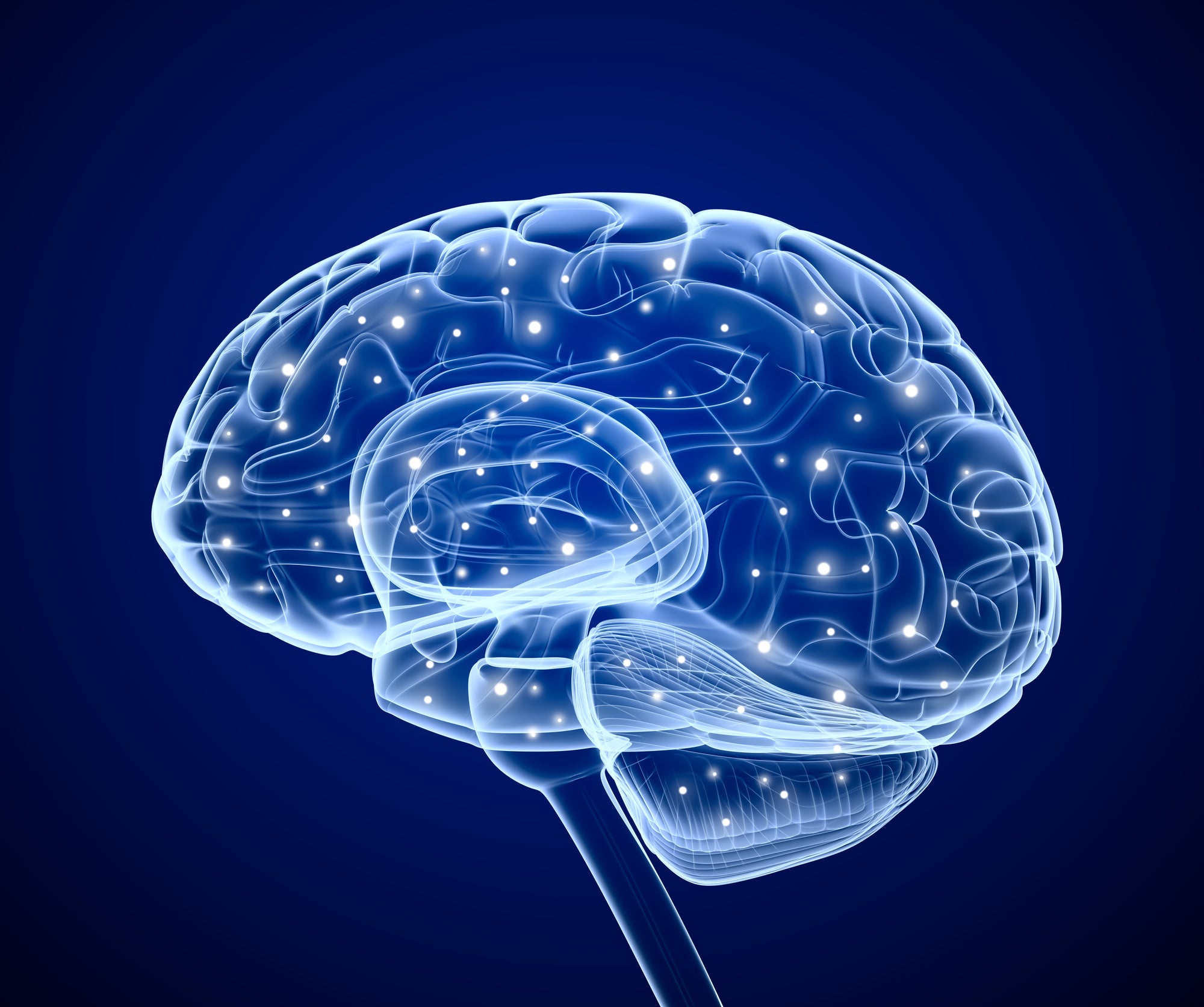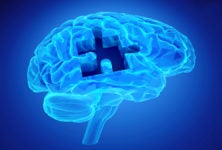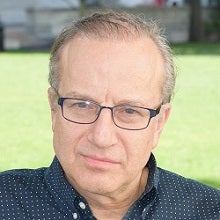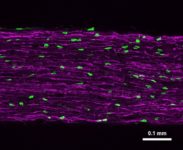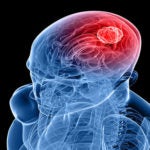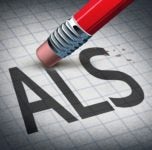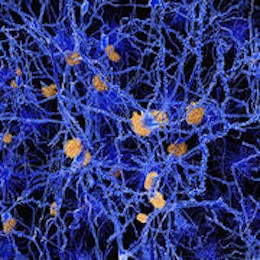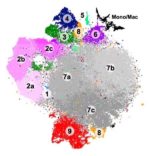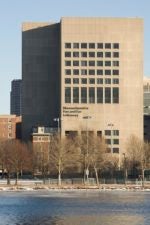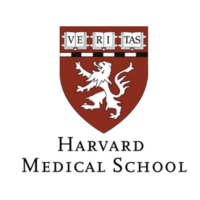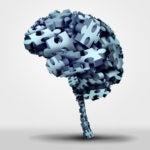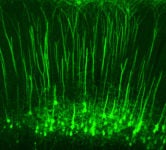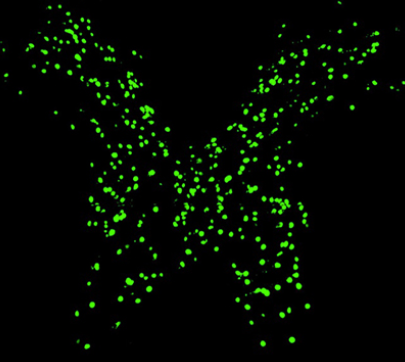Neuro Topics - Therapeutics
SEARCH OTHER RESEARCH AREAS
March 27, 2024
Preliminary results of a first-in-human trial for a new CAR T-based treatment targeting two different sites on glioblastoma tumors result in dramatic, but transient, reductions in tumor size.
Original article in: New England Journal of Medicine >
September 27, 2023
Harvard Gazette article on the creation newly designed device that can help test treatments in patients with gliomas, a type of tumor that originates in the brain or spinal cord. This device is the shape and size of a grain of rice, and is designed to be used during standard of care surgery and can conduct dozens of experiments at once offering unprecedented insight into the effects of drugs on glioma tumor. From the team of Oliver Jonas and colleagues, first author Pierpaolo Peruzzi.
Original article in: Science Translational Medicine >
August 9, 2023
HMS News article on new research from Francisco Quintana and colleagues, first author, Liliana M. Sanmarco, designing a probiotic suppressing autoimmunity in the mouse brain, a condition that occurs when the immune system attacks the cells of the central nervous system. This technique offers a more precise way to target brain inflammation and minimizes negative side effects when compared with standard therapies.
Original article in: Nature >
June 16, 2023
Harvard Gazette article on a Mass. General Brigham led clinical trial (first author Amit Anand). Of the 403 patients studied, they found that 55 percent of those receiving ketamine treatment experienced a sustained improvement in depressive symptoms without major side effects.
Original article in: New England Journal of Medicine >
June 16, 2023
Harvard Gazette Q+A with Fangyun Tian who was the first author of a recent MGH study tracing the effects of ketamine, a fast-acting antidepressant with potential for abuse due to its dissociative effects, to three regions of the human brain. The prefrontal cortex and hippocampus are believed to have a role in the drug’s effectiveness as an antidepressant, while the posteromedial cortex, in the back portion of the brain, is a likely site for dissociative effects.
Original article in: Nature Communications >
May 25, 2023
HMS News article on new research from Joseph Arboleda-Velasquez, Yakeel Quiroz, and colleagues. They studied the extraordinary case of a patient with strong genetic predisposition for early-onset Alzheimer’s disease who remained cognitively intact more than two decades beyond the expected age of memory impairment. This led to the discovery of a protective variant, a pathway for ‘resilience’ to dementia, and the identification of a brain region to target with therapies.
Original article in: Nature Medicine >
May 25, 2023
HMS News article on new research from Christopher A. Walsh and Kristopher T. Kahle, co-first authors Sattar Khoshkhoo and Yilan Wang, examining the role of somatic mutations — DNA alterations that occur after conception — in Temporal Lobe Epilepsy (TLE) and suggesting the potential of using existing cancer therapies to treat TLE that is resistant to anti-seizure medications.
Original article in: JAMA Neurology >
May 11, 2023
HMS News article on new research from David Corey, Artur A Indzhykulian, and colleagues, first author Maryna Ivanchenko. Using mice, the team designed a “mini gene” that could in the future be developed into a therapy for Usher Syndrome type 1F, a severe genetic condition that causes blindness and deafness.
Original article in: Nature Communications >
April 25, 2023
Loss of the inner ear sensory cells, the hair cells, is considered one of the most common causes of hearing loss that is generally permanent. Using single-cell RNAseq, advanced imaging, electrophysiology, and lineage tracing, Yizhou Quan, Zheng-Yi Chen, and colleagues identified a cocktail of drug-like molecules that effectively reprograms fully mature wildtype supporting cells for hair cell regeneration, representing a step forward for hearing restoration by HC regeneration.
Original article in: PNAS >
January 25, 2023
HMS News article on new research from Khalid Shah and colleagues, first author Kok-Siong Chen, on the development of a new cell therapy approach engineered to eliminate established tumors and to train the immune system to prevent cancer recurrence.
Original article in: Science Translational Medicine >
January 25, 2023
HMS News article on new research from Tamara Fong, Sharon Inouye, and colleagues, finding that the modified and extended version of the Hospital Elder Life Program (HELP-ME), a well-established and highly successful delirium prevention program, is both feasible and acceptable to hospital staff and patients.
Original article in: Journal of the American Geriatrics Society >
October 14, 2022
Boston Children's Hospital Answers article on new research from Maria Lehtninen, Naama Kanarek, and colleagues, first author Ahram Jang, on the feasibility of targeting the cerebrospinal fluid and choroid plexus to treat "chemo-brain"-- a side effect of chemotherapy that makes it harder to remember things, maintain attention, and learn new information.
Original article in: Neuron >
July 26, 2022
Erinc Hallacli and colleagues in Vikram Khurana’s lab show a new function of Parkinson’s Disease protein alpha-synuclein in modulating Processing Bodies, cellular hubs for mRNA control. The work has physiologic and therapeutic implications for the delicate balance between lipid biology and RNA homeostasis in the cell dictated by alpha-synuclein.
Original article in: Cell >
May 24, 2022
HMS News article on new research from Christopher J. Hartnick and colleagues, first author Phoebe K. Yu, demonstrating that a surgically implanted device that moves the tongue forward during sleep can safely and effectively reduce sleep apnea in adolescents with Down syndrome.
Original article in: JAMA Otolaryngology–Head & Neck Surgery >
May 24, 2022
HMS News article on new research from Christopher J. Hartnick and colleagues, first author Phoebe K. Yu, demonstrating that a surgically implanted device that moves the tongue forward during sleep can safely and effectively reduce sleep apnea in adolescents with Down syndrome.
Original article in: Nature Communications >
May 4, 2022
HMS News article on new research from Benjamin Neale and colleagues at the Broad Institute, first author Duncan Palmer, revealing new insight into the condition’s molecular underpinnings.
Original article in: Nature Genetics >
September 14, 2021
Harvard Gazette Q+A with Michael Pollan on his new book investigating how opium, caffeine, and mescaline affect the mind.
Original article in: Nature Genetics >
September 14, 2021
Boston Children's Hospital Answers article on new research from the labs of Basil Darras and colleagues showing that the oral drug Risdiplam improves motor function in infants, including the ability to sit unassisted for a period of time. They were also more likely than the controls to achieve motor milestones and lived longer than would be expected.
Original article in: New England Journal of Medicine >
September 1, 2021
Boston Children's Hospital Answers article on new research from the Developmental Behavioral Pediatrics Research Network (DBPNet), first author Elizabeth Harstad, comparing two types of ADHD medications in preschool-age children. They found that alpha-2-adrenergic agonists like guanfacine and clonidine are effective in reducing ADHD symptoms but with a lower rate of side effects than stimulants.
Original article in: JAMA >
August 11, 2021
Boston Children's Hospital Answers article on new research from Edward Smith and colleagues, first author Julie Sesen, showing that the levels of a specific protein detected through a patient’s urine can track a tumor’s size and responsiveness to treatment in children with diffuse intrinsic pontine gliomas (DIPG).
Original article in: Brain Research >
July 27, 2021
Xuan Huang and Kasper Roet from the Woolf lab introduced a new phenotypic screening platform targeting neuronal excitability. Using the fluorescent GCaMP reporter and a chemogenomic library, they were able to identify molecular targets that modulate ALS motoneuron hyper-excitability.
Original article in: Cell Reports >
July 13, 2021
The development of new, safe, and effective treatment options for neuropsychiatric illness has been very challenging. Brian Kangas, Bill Carlezon and Diego Pizzagalli share new work aiming to accelerate progress in this critical research area, with the development of behavioral and neural testing methods in rats designed to have high concordance to methods used in clinical patient populations.
Original article in: Nature >
July 13, 2021
Jakob Hartmann and Kerry Ressler share new research dissecting the interplay between key proteins involved in regulating the body’s stress response. Their work provides novel insight into mechanisms of stress homeostasis and points to potential therapeutic targets when this response goes awry.
Original article in: Cell Reports >
June 21, 2021
Lili Xie shares new research from the lab of Larry Benowitz showing that the chemokine CCL5 promotes optic nerve regeneration and mediates many of the beneficial effects of Ciliary neurotrophic factor (CNTF) gene therapy.
Original article in: PNAS >
May 5, 2021
Miao He, Jessica Page and Zhigang He share a new study achieving precise targeting of intra-spinal propriospinal networks with targeted non-invasive AAV vector labeling. Selectively modulating specific populations of propriospinal neurons in injured and paralyzed mice resolved their contributions to key locomotor behaviors-- demonstrating the potential of this strategy for functional restoration following spinal cord injury.
Original article in: Nature Communications >
May 4, 2021
Round up of awards and honors earned by the HBI community.
Original article in: Nature Communications >
April 23, 2021
Harvard Gazette article on new research from the lab of Christina Woo, first author Yun Ge, on the development of a new highly-selective tool to study proteins through the sugars they depend on.
Original article in: Nature Chemical Biology >
March 23, 2021
Harvard Gazette article on new research from Min Dong, David Liu, and colleagues, first author Travis Blum, on the potential of botulinum toxin therapies to aid in neuroregeneration, regulating growth hormones, calming rampant inflammation, or dampening cytokine storms.
Original article in: Science >
February 12, 2021
Yusuke Fukuda from the lab of Rosalind Segal shares new work identifying and exploring the function of an RNA-binding protein called SFPQ, which selectively binds to KIF5A--a kinesin motor protein in axons which is frequently mutated in Charcot-Marie-Tooth disorder and other neurodegenerative diseases.
Original article in: Journal of Cell Biology >
February 8, 2021
Harvard Gazette article recapping an online seminar about mental health during the pandemic. Experts from the Harvard T.H. Chan School of Public Health, the National Alliance on Mental Illness (NAMI), and the Dr. Lorna Breen Heroes’ Foundation gathered for an hour long online discussion of what may be one of the pandemic’s most painful if lesser-recognized effects.
Original article in: Journal of Cell Biology >
February 8, 2021
Round up of awards and honors earned by the HBI community
Original article in: Journal of Cell Biology >
November 30, 2020
BCH Discoveries article on new research from the labs of Judith Steen and Hanno Steen, co-first authors Hendrik Wesseling and Waltraud Mair. They find that the Tau protein looks very different at different stages of Alzheimer's disease, undergoing a series of chemical changes over time. This discovery suggests that multiple Alzheimer's drugs may be needed, to target different disease stages.
Original article in: Cell >
November 30, 2020
BCH Discoveries article on new research from the lab of Zhigang He, joint first authors Yi Li, Xuelian He, and Riki Kawaguchi. They studied recovery from spinal cord injury in neonatal mice and found that microglia cells play a crucial role in the healing process.
Original article in: Nature >
November 13, 2020
Tatsuya Tsukahara shares new research from the lab of Sandeep Robert Datta, on the use of their Motion Sequencing (MoSeq) behavioral analysis technique, built on 3D animal postures and unsupervised machine learning, to organize large and complex behavioral datasets from mice treated with neuroactive and psychoactive drugs.
Original article in: Nature Neuroscience >
November 27, 2019
New research from the labs of Joshua Sanes, Zhigang He and colleagues provides novel insights into the CNS injury response of axons and how it might be improved.
Original article in: Neuron >
November 27, 2019
HMS News article on new research from the lab of Yakeel Quiroz-Gaviria and colleagues, first authors Joseph F. Arboleda-Velasquez, Francisco Lopera, and Michael O’Hare, identifying a new gene variant that may protect against Alzheimer's disease.
Original article in: Nature Medicine >
November 1, 2019
The Society for Neuroscience (SfN) presented its highest honor, the Ralph W.Gerard Prize in Neuroscience, to Michael Greenberg and Catherine Dulac.
Original article in: Nature Medicine >
November 1, 2019
Her research shows how neurons outside of the brain — those that control the sensation of touch — can alter brain function and shape select behaviors associated with autism spectrum disorders (ASD).
Original article in: Nature Medicine >
November 1, 2019
The 2019 Cowan Award was presented to Dr. Joshua R. Sanes for outstanding contributions in developmental neuroscience.
Original article in: Nature Medicine >
November 1, 2019
The College on Problems of Drug Dependence (CPDD) has presented McLean Hospital’s Bertha K. Madras, PhD, with its Innovator Award.
Original article in: Nature Medicine >
November 1, 2019
This award is made possible by a generous gift from the Aramont Charitable Foundation and provides critical funding to advance high-risk, high reward science conducted by graduate students, postdoctoral fellows, and junior faculty.
Original article in: Nature Medicine >
October 26, 2019
This award challenges investigators at all career levels to pursue new research directions and develop groundbreaking, high-impact approaches to a broad area of biomedical, behavioral or social science.
Original article in: Nature Medicine >
October 15, 2019
New research from the labs of Sara Lazar and colleagues, first author Gunes Sevinc, suggests that mindfulness meditation training alters how we process fearful memories.
Original article in: Biological Psychiatry >
October 4, 2019
Pioneers of optogenetics celebrated at 2019 Warren Alpert Prize Symposium
Original article in: Biological Psychiatry >
September 20, 2019
A new perspective piece from Charles Lieber and Shaun Patel on how precision electronic medicine in the brain can offer a better way to treat brain disorders, control prosthetics, or even enhance cognitive abilities.
Original article in: Nature Biotechnology >
August 8, 2019
New research points to potential therapy for abnormal touch sensitivity in autism spectrum disorders.
Original article in: Nature Biotechnology >
July 23, 2019
Regardless of what genetic mutation causes glioblastoma, it can readily shift among four distinct cell types, each of which may need to be targeted separately.
Original article in: Nature Biotechnology >
July 3, 2019
HMS News article on new research from the labs of David Corey, Jeffrey Holt and Gwenaëlle Géléoc. They used a newly optimized gene-editing tool to prevent hearing loss in mice with hereditary deafness without detectable off-target effects.
Original article in: Nature Medicine >
June 28, 2019
Digital devices can interfere with everything from sleep to creativity
Original article in: Nature Medicine >
June 28, 2019
How one species of bacteria consumes the primary treatment for Parkinson’s disease could reveal more about how the microbiome impacts our health.
Original article in: Science >
June 21, 2019
The Chan Zuckerberg Initiative (CZI) recently selected 38 collaborative science teams to launch CZI’s Seed Networks for a Human Cell Atlas projects, including a Harvard team focused on mapping cells of the human eye from birth to old age.
Original article in: Science >
June 21, 2019
Wyss Institute scientists have developed chip technology that mimics the blood-brain barrier in humans. The new models will help researchers study drugs to treat cancer, neurodegeneration, and other diseases of the central nervous system.
Original article in: Nature Communications >
May 20, 2019
Chenjezo Grant Gonani wants to build culturally relevant mental health care
Original article in: Nature Communications >
April 30, 2019
Harvard Medical School receives $4.5 million for cannabinoid research from Harvard University from Charles R. Broderick, an alumnus of Harvard University and MIT.
Original article in: Nature Communications >
April 15, 2019
Brain imaging reveals neural network changes that may explain resistance to changes in brain structures caused by childhood maltreatment.
Original article in: Biological Psychiatry >
April 9, 2019
Scientists at Dana-Farber Cancer Institute and Massachusetts General Hospital (MGH) have successfully cleared patient-derived brain cells of an abnormal protein associated with dementia and other neurogenerative disorders.
Original article in: eLife >
April 3, 2019
HMS News article on a new report from Isaac Kohane and colleagues at Google outlining the promises and pitfalls of machine learning in medicine.
Original article in: New England Journal of Medicine >
March 12, 2019
Charles Lieber and his colleagues published a paper on neural probes that are less detectable by the human brain and may be more effective in treatment.
Original article in: Nature >
March 4, 2019
Stephen Zhang, a neuroscience graduate student in the labs of Michael Crickmore and Dragana Rogulja, was awarded a 2019 Harold M. Weintraub Graduate Student Award by the Fred Hutchinson Cancer Research Center
Original article in: Nature >
March 4, 2019
This award is the highest honor given by the Learning Disabilities Association of America. It's given annually in recognition of and appreciation for outstanding leadership at the national level.
Original article in: Nature >
January 31, 2019
This paper explores what NK cells do in response to nerve injury and how understanding that could lead to better treatments for pain.
Original article in: Nature >
January 30, 2019
HMS News article, on new research from the team of PierPaolo Peruzzi, E. Antonio Chiocca, and colleagues (first author Vivek Bhaskaran), showing how certain microRNAs can weaken brain cancer cells in advance of standard therapy in preclinical models.
Original article in: Nature Communications >
January 18, 2019
A new discovery opens doors to improving diagnostics and developing new therapy for majority of ALS patients
Original article in: Nature Neuroscience >
December 20, 2018
Along with along with Larry Zipursky, Josh Sanes has been awarded the 2018 Perl-UNC Neuroscience Prize for the “discovery of cell-surface proteins that control circuit assembly in the visual system.”
Original article in: Nature Neuroscience >
December 20, 2018
Isaac Chiu and Debora Marks were awarded Ben Barres Early Career Acceleration Awards. David Walt and George Church were awarded a Collaborative Science Award by the Chan Zuckerberg Initiative.
Original article in: Nature Neuroscience >
December 20, 2018
HMS News article on new research from the lab of Qiufu Ma identifying the nerve pathway that drives sustained pain following injury.
Original article in: Nature >
December 11, 2018
In the glimpse of the past provided by organoids, Paola Arlotta sees a chance to shape the future of how we fight neurological disease
Original article in: Nature >
December 3, 2018
Congratulations to Carl Nist-Lund, Bifeng Pan, Jeffrey Abbott, Tianyang Ye, Swathi Ayloo, Brian Wai Chow, and Kevin Sitek. Each winner will receive $200 and a customized desk plaque with their image.
Original article in: Nature >
December 1, 2018
HMS News article on new research from the labs of Beth Stevens and Steven McCarroll on identifying which microglia in the brain are "good" and which are "bad".
Original article in: Nature >
November 27, 2018
Boston Globe story on new work from Eric Holbrook and colleagues, taking initial steps towards a potential treatment for anosmia, the loss of the sense of smell.
Original article in: International Forum of Allergy and Rhinology >
November 21, 2018
They were recognized for scientifically and socially distinguished work
Original article in: International Forum of Allergy and Rhinology >
November 5, 2018
HMS News article on an announcement by the Bertarelli Foundation and HMS of four new collaborative research grants given to Harvard neuroscientists tackling sensory disorders--from hearing loss, deafness and blindness to acute and chronic pain.
Original article in: International Forum of Allergy and Rhinology >
October 9, 2018
BCH Vector Blog post on new work from the labs of Mustafa Sahin, Wade Regehr and colleagues, delineating sensitive periods for the treatment of cerebellum-mediated autistic-like behaviors in mice
Original article in: Cell Reports >
September 12, 2018
HMS News article highlighting a new study from the labs of Zhigang He, Clifford Woolf and colleagues identifying neurons in the brain that influence touch sensitivity.
Original article in: Nature >
August 31, 2018
HMS News article highlighting recent work from the Spaulding Rehabilitation Hospital Motion Analysis Lab (Paolo Bonato and colleagues) unveiling the complexities of arm and head movements.
Original article in: Nature Scientific Reports >
July 23, 2018
New study from the lab of Zhigang He at Boston Children's Hospital and Harvard Medical School, on a compound that gets mice with spinal cord injury to recover their stepping ability
Original article in: Cell >

